Almost two months after the banks of the Mahaica Creek were flooded resulting in heavy losses of crops and livestock, residents have finally started to see dry ground but are only able to do limited farming because of the soggy earth.
The water has receded completely from most places at Grass Hook and some residents have even started farming again on the high spots. They suffered tremendous losses as they had invested most of their savings into the crops just before the floods destroyed their produce.
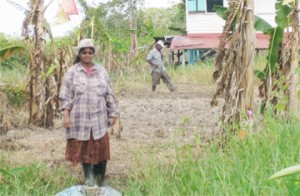
The residents said the government promised to assist them with items such as seeds and fertilizer and they were still waiting. They had gotten food hampers from the government and two organizations and after that ran out they “had to use the lil savings we had left.”
Agriculture Minister Robert Persaud visited Mahaica yesterday to continue the distribution of seeds, fertilisers and other planting materials and to meet with farmers and residents to discuss measures to ensure they continue their farming.
During a visit by Stabroek News to the area on Thursday it was difficult to tell that it was affected by such intense flooding and the only trace was the soggy land that residents are waiting on to dry completely before they can start farming again.
The residents who earn their living mainly through cash crop and livestock farming were in brighter spirits as the water receded but their main concern was getting money to replant their crop.
Pensioner, Doris Ramdass of Grass Hook said the water had receded from her land over two weeks ago. She lost all her produce except for a few sucker plants which managed to survive the flood.
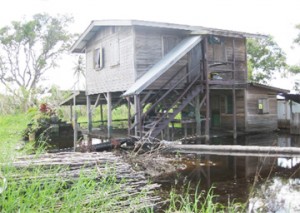
She said her land was empouldered and she was happy that she found a piece of dry land to cultivate a few bora and thyme plants with the assistance of her grandson, Jewan Ramdass and husband – who hurt himself while trying to fork the garden.
The other sections of the land, she said are still soft and she would have to wait a while for it to dry. She said her daughter promised to assist her with a few pepper and boulanger plants in the meantime until help comes from the government.
The woman said they had just started to reap bora which “had good price” when the flood destroyed her crop.
Sugrim Sarju who invested in five acres of cash crop said he lost almost everything to the flood except for a section of bora and peppers that were on a high spot. However, he said rats destroyed the plants and he ended up losing that as well.
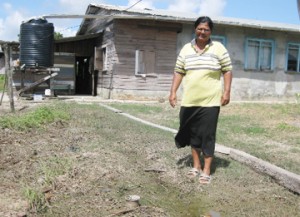
The man said that apart from losing his crop he also lost his pet dog and seven goats. He was waiting on his land to dry to start cultivating and said he did not have money to return to his crop and is depending on help he got from his relatives from overseas.
Sarju said although farmers lost a lot they were only promised a little seed and fertilizer to start again. He said that was not enough and that they should have been given monetary compensation because water was released deliberately by the East Demerara Water Conservancy from the Maduni and Lama sluices.
`Forcing the land’
He is calling on the government, particularly President Bharrat Jagdeo to visit the creek while it is dry to see the amount of farming that is done so as to understand the extent of their loss. He said that although the land has not dried properly some farmers are anxious to start earning again and are “forcing the land” to plant. He said they would have less than three months of farming before the rainy season starts again.
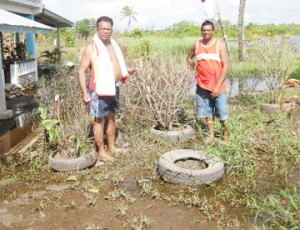
Sarju was distressed too that his flower plants were destroyed and he would not have flowers to perform his daily prayers.
His brother, Krishna, who came from Canada along with other relatives for his uncle, Ganga Sarju’s funeral said “Mahaica Creek is the bread-basket of the country and whenever the creek floods there is a shortage of vegetables, the price would go up.”
He said that he called Ganga a few times during the flood and that he was deeply stressed out and frustrated with the situation. He said the man was complaining that he lost all his produce and had no income.
He recalled that his uncle collapsed and was taken to the hospital and that one hour before he died he spoke to him and “the topic was about the flood. He was telling me that to ease the flood situation the mouth of the river [Mahaica] would have to be dredged and I agreed with him because it would take off a lot of water.”
Krishna said too that the digging of the Hope relief canal on the East Coast was a “good solution for farmers and they should done it a long time ago.” He pointed out that “from the 2005 flood to now there was a lot of flooding and residents are afraid to put down their crops.”
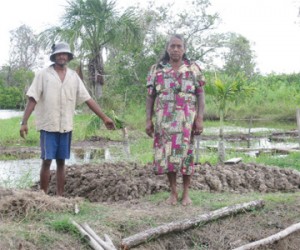
Further he mentioned that because of the flooding his uncle’s funeral could not have taken place from his own home. He said too that he was holidaying in the creek when the flood started in December and when he returned for the funeral a neighbour who had lived there all his life was forced to move out.
SN caught up with Naresh Ramdass as he was busy forking a plot of land to start planting again. His wife, Bissoondai told this newspaper that “water still coming out of the land.” She said they had some bora seeds but it had started to get black and she was not sure if it would germinate.
She said they still have to be on the alert for flooding because the rain has not quite stopped. “Right now we afraid to plant and things really hard; whenever the water “wash” it would go back in the yard.”
She was grateful for the little assistance she got from government and the organizations and said when that was finished she “had to use the lil money me had in a corner.” Her daughter was forced to quit her computer classes because she could not afford to send her.
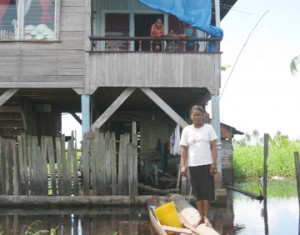
Mud paste
Kuldeo Indar said he invested all of his money to cultivate 3000 roots of bora and 100 squash plants and “everything went down the drain.”
He has started to pull out the dried plants from the farm but he was unable to start farming again because “when me try to fork the mud paste up on the fork and me had to stop. When you walk and all you foot bury deep in the mud.”
He was glad for any help he could get to start back his crop. He said he only has a little bora seed to start on his own and would have to buy the rest of the items. But he was not sure where the money was coming from.
He said he used up his savings so that he and his family of five could survive. “Right now it hard on awe; when we plant bora we gat to wait six weeks to reap. We don’t know what the May/June rain gon do to we yet.
Further, he said government needs to fix the dam close to the East Demerara Water Conservancy “so they wouldn’t have to worry that the dam gon breach and release the water.”
Over at Big Baiboo, a widow, Chitrawattie Ramcharitar was happy that the water has finally receded and that she could stand in her yard again. She said the floodwaters which had also gotten in her kitchen, was causing her to experience a lot of pain.
She said she had borrowed money to invest in the crop which she lost completely. She is unable to sleep at nights because she was worried about getting the money to repay.
Though she is anxious for the land to dry to start planting again she is hoping that government can provide the assistance even before the land dries out.
Another resident, Padmoutie Pooran was not so fortunate to have a dry yard and said she has to keep her children upstairs all the time. Her youngest child, a nine-year-old cannot go to school because Pooran has to cook on a fireside in the yard and she is not able to do so early.
Her two other children, 12 and 16-years-old both quit school after writing the common entrance because their mother could not afford to send them to the “road school.”
She said at the moment she has to pay a high price for vegetables which she was accustomed to getting in abundance. Her husband had gone to the backdam to catch fish to sell for their survival. Like other residents, she too was anxious for the help from government to start planting again.
She related that her in-laws who resided next door had to abandon their house and moved to their daughter’s house on the East Coast.
She said soon after the flood started her mother-in-law, Daywantie Samaroo was going to take a bath in their outdoor bathroom when she was bitten by a snake. The woman who is diabetic also suffered a stroke as a result of the snake-bite.





